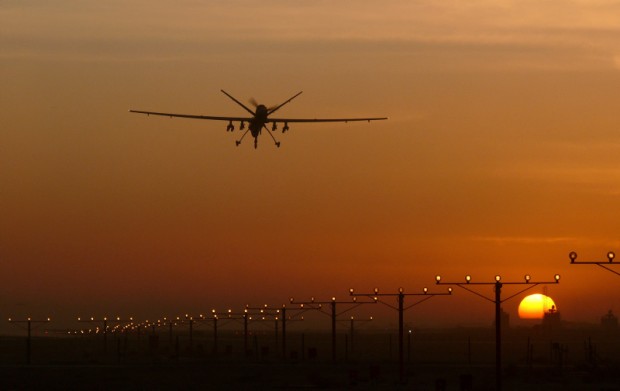There is widespread reporting in the news today that the Prime Minister has asked the Ministry of Defence to look at doing more to counter the threat of ISIL, including considering investing in more remotely piloted air systems and Special Forces.
Defence budget
The BBC, Sky, FT, Independent and several other outlets carry the Prime Minister’s request to the MOD to consider increasing UK Special Forces and to prioritise buying more spy planes and remotely piloted air systems as part of this year's Strategic Defence and Security Review. Defence Secretary Michael Fallon completed a round of interviews on the subject this morning which were carried on Good Morning Britain, BBC Radio 4’s Today programme, BBC News Channel, LBC and BBC Radio Five Live, in which he said we currently easily meet NATO’s 2% target and it’s up to NATO to rule what type of spending should be included or not; humanitarian work is rightly already paid for by the overseas aid budget and the remit of the defence budget will be marginally larger to include some spending on defence intelligence. He added that the new Parliament needs to decide whether to act in Syria and that there are no plans for a quick vote.
The articles also reported Mr Cameron’s plans to visit RAF Waddington today and to meet some of the crew of the aircraft carrier HMS Queen Elizabeth at Downing Street. The Sun writes that there is a risk of a row with military chiefs over fears that the commitment could mean cuts elsewhere. The Telegraph says the MOD is taking a propaganda war to ISIL by regularly broadcasting strike footage and an online log of targets.
A Ministry of Defence spokesperson, said:
By increasing defence spending in real terms every year and meeting the NATO 2 per cent target for the rest of the decade, we are sending a strong message to both our allies and enemies.
The threats we face require a full spectrum response, from a range of departments. Our Armed Forces and Security Agencies work closely together to defend the UK from many of these threats and so it is right that the contribution made by the Intelligence Agencies can be included. It underlines the government’s commitment to defence and the national security of our country.
Army harassment
The Daily Mail picks up yesterday’s BBC story on the Army’s sexual harassment survey. Its short piece reports that around 40% of female soldiers in the British Army have received unwelcome comments about their looks or sexuality. More than one in 10 servicewomen - some 13% - had had a 'particularly upsetting experience' involving sexual harassment. It carries General Sir Nick Carter’s comments that he was “disappointed” with the figures and that they provide him with a baseline from which to move forward and to change the Army’s culture. He added that there would be a new code of leadership in September and that the complaints procedure would be “sound” so that people felt that they could complain.
General Sir Nick Carter, Chief of the General Staff, said:
These results are entirely unacceptable and that is why I am publishing them. I want to maximise the talent in the Army and attract others to join, this gives me a transparent platform against which I can show how the Army is going to move forward to the best possible place and I want to be an inclusive employer, I want to be a modern employer and I want to create the sort of environment where all - people regardless of ethnicity, gender or sexuality - feel they can serve alongside each other.
Type 26
The Times (Scottish edition) carried a misleading and factually incorrect story about the Royal Navy’s Type 26 ships, which suggested that the future of the programme could be uncertain.
We can be very clear that the future of the programme is not uncertain. The MOD and BAE Systems are working together to deliver the Royal Navy’s Type 26 ships in a way that sustains momentum but maximises value for the taxpayer. This means only committing when we understand the next phase fully, and is an incremental approach that draws on key lessons from Queen Elizabeth Class aircraft carrier programme.
We have already committed to the £859 million Demonstration Phase, which includes ordering long lead items for the first 3 ships, and will begin manufacturing on the Clyde in 2016.
Image of the day

Follow us on Twitter and don’t forget to sign up for email alerts.
